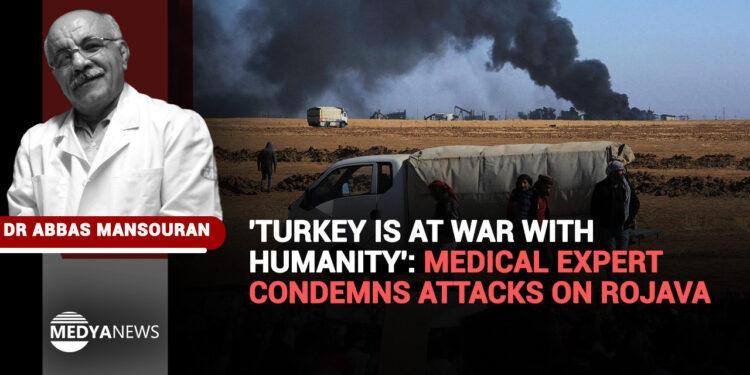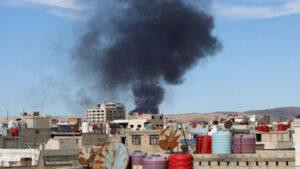In an exclusive piece written for Medya News, Iranian born epidemiologist Dr Abbas Mansouran condemns Turkish attacks on North and East Syria as war crimes, citing civilian targeting. He warns of mounting humanitarian crises and threats to democratic autonomy.

Dr Abbas Mansouran
Rojava (Syrian Kurdistan) is undergoing a devastating attack by the Turkish government and its allied forces. Dozens of cities and hundreds of villages are on fire, their inhabitants caught in a nightmare of violence and destruction.
This new wave of aggression began on the evening of 23 October, targeting civilian areas, infrastructure, and essential services. Hospitals, schools, residential areas, and vital facilities have been systematically destroyed. The Turkish military has rained bombs, shells, and mortars on the region, causing immense suffering and loss of life.
Despite the scale of the humanitarian crisis, the international community remains largely silent. The Turkish government, encouraged by this international indifference, has seized the opportunity to launch its attack while the world’s attention is focused on other conflicts.
The consequences of this aggression extends far beyond Rojava.
 Turkish airstrikes against Kurdish-led North and East Syria have resulted in widespread catastrophe throughout the region
Turkish airstrikes against Kurdish-led North and East Syria have resulted in widespread catastrophe throughout the region
Humanitarian catastrophe
The destruction of infrastructure and the displacement of civilians have created a humanitarian catastrophe throughout the broader regions governed by the Democratic Autonomous Administration of North and East Syria (AANES). The region’s stability is threatened, and the potential for further regional conflict looms large.
The international community must take immediate action to condemn the Turkish government’s aggression and demand an end to these war crimes. The people of Rojava deserve our support and solidarity. We must not allow their suffering to continue to be ignored.
The Turkish military is at war with humanity, conducting deliberately genocidal acts, all fully supported by the imperialist ideology of Turkey’s rulers. The Turkish government has attacked women, children, and the disabled day and night with bombs, heavy shelling, and chemical weapons. The current invasion of Rojava and the Sinjar region was ordered on the pretext of an attack by two guerrillas on an arms factory in Turkey. Collective punishment was swiftly enacted on the civilians of Rojava and Sinjar as bombs rained down from the sky causing much death and destruction.
The Turkish government, according to the latest reports, has deprived more than 2,230 villages of electricity, water, and life in a wide range of settlements throughout North and East Syria. The power plant supplying electricity to the three hundred villages around Ain Issa has been deliberately targeted, plunging the area into darkness.
With these destructive and deadly attacks, the Turkish regime and its accomplices are seeking to continue their economic and political domination, the rule of tyranny, and the captivity of the free life of the people. The occupiers view their dominance as being secured through destroying the pioneering model of bottom-up governance and political autonomy that has been practiced throughout North and East Syria and the Yazidi homeland of Sinjar since 2014.
Rojava has emerged as a beacon of hope, offering free education, healthcare, and energy to its diverse population. This self-governing region, once under the brutal rule of ISIS, has defied expectations and built a model of democratic autonomy. However, Turkish invasions and the policies of occupying forces threaten to destroy this hard-won progress. Their goal is to suppress popular resistance, particularly the role of women in self-governance, beleaguered cooperatives, and the region’s vital water resources. The region’s military forces have fought tirelessly to protect Rojava, sacrificing thousands of lives to defeat ISIS and other extremist groups. They are committed to preserving the region’s ecosystem, ensuring the flow of the Tigris and Euphrates rivers, and providing a future of hope and prosperity for its people.
Long-term challenges
The progress of democratic autonomy is under constant threat from Turkey’s repeated invasions and the resurgence of extremist groups. These attacks aim to dismantle the region’s democratic institutions and suppress its vibrant culture. By targeting critical civilian infrastructure like power plants and water supplies, the Turkish government seeks to cripple Rojava’s resilience and force its people into submission. Until three years ago, there was no sign of drug smuggling and the ravages of addiction in the region. Now terrorist gangs in the region, largely composed of surviving ISIS fighters, have been ordered by Turkey and its agents to distribute a variety of drugs, including captagon, throughout the region.
Despite all the challenges they face, the people of Rojava remain steadfast in their resistance. They continue to fight for their freedom, autonomy and vision of a just and equitable society.
Silence of international organisations
The crisis ignited by the Turkish government affects the stability and security of the region and can lead to irreparable regional tensions and conflicts. This crisis has affected international relations in the region and contributed to the complexity of regional crises and conflicts. Widespread violation of human rights in Rojava, Sinjar and the broader region, including the right to life, freedom, and security, is the cause of a severe human rights crisis on a global scale.
The systematic targeting of civilians, the destruction of infrastructure, and the displacement of millions of people are clear indications of war crimes and crimes against humanity. The international community must condemn these atrocities and take immediate action to protect the lives and rights of the affected populations. Silence, in the face of such brutality, is unacceptable and will only embolden the perpetrators. It is imperative that international organisations, such as the United Nations and the Human Rights Commission, act swiftly to investigate these crimes and hold those responsible accountable.
The future of Rojava, a symbol of hope and resistance, depends on the international community’s collective efforts. To ensure accountability for these heinous crimes, the international community must take decisive action. This includes strengthening international legal mechanisms and pursuing legal action against individuals responsible for the atrocities. By holding perpetrators accountable, we can send a strong message that such crimes will not be tolerated and work towards preventing future human rights abuses.
ISIS resurgence
The ongoing Turkish occupation and nightly attacks since 23 October have significantly increased the risk of a resurgence of ISIS in the region, as the remnants of the group have become proxies for the Turkish regime. This poses a grave threat, not only to the region, but also to the Middle East more widely and Europe.
The sacrifices of over 15,000 fighters and the resilient civilian population of the region have mitigated this risk, and the world owes a debt of gratitude for their efforts in defeating ISIS and other extremist groups.
The international community must condemn these atrocities and take immediate action to protect the lives and rights of the affected populations. Silence in the face of such brutality is unacceptable and will only encourage the perpetrators. The future of Rojava, a symbol of hope and resistance, depends on the international community’s collective efforts.
Dr. Abbas Mansouran is an Iranian-born epidemiologist based in Sweden. He has expertise in burn injuries, having worked extensively in this field during the Iraq War in the 1980s. Mansouran has also conducted independent research in North and East Syria, investigating medical facilities and providing treatment to the wounded, amid allegations of chemical weapons use by Turkey.

